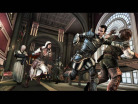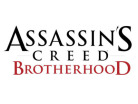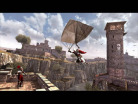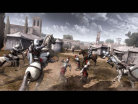- CLASSIC MAGAZINES
- REVIEW CREW
A show recapping what critics thought back
when classic games first came out! - NEXT GENERATION'S BEST & WORST
From the worst 1-star reviews to the best
5-stars can offer, this is Next Generation! - NINTENDO POWER (ARCHIVE)
Experience a variety of shows looking at the
often baffling history of Nintendo Power! - MAGAZINE RETROSPECTIVE
We're looking at the absolutely true history of
some of the most iconic game magazines ever! - SUPER PLAY'S TOP 600
The longest and most ambitious Super NES
countdown on the internet! - THEY SAID WHAT?
Debunking predictions and gossip found
in classic video game magazines! - NEXT GENERATION UNCOVERED
Cyril is back in this spin-off series, featuring the
cover critic review the art of Next Generation! - HARDCORE GAMER MAGAZING (PDF ISSUES)
Download all 36 issues of Hardcore Gamer
Magazine and relive the fun in PDF form!
- REVIEW CREW
- ELECTRONIC GAMING MONTHLY
- ELECTRONIC GAMING MONTHLY RANKS
From Mario to Sonic to Street Fighter, EGM
ranks classic game franchises and consoles! - ELECTRONIC GAMING MONTHLY BEST & WORST
Counting down EGM’s best and worst reviews
going year by year, from 1989 – 2009! - ELECTRONIC GAMING BEST & WORST AWARDS
11-part video series chronicling the ups and
downs of EGM’s Best & Worst Awards!
- ELECTRONIC GAMING MONTHLY RANKS
- GAME HISTORY
- GAME OVER: STORY BREAKDOWNS
Long-running series breaking down game
stories and analyzing their endings! - A BRIEF HISTORY OF GAMING w/ [NAME HERE]
Real history presented in a fun and pithy
format from a variety of game historians! - THE BLACK SHEEP
A series looking back at the black sheep
entries in popular game franchises! - INSTANT EXPERT
Everything you could possibly want to know
about a wide variety of gaming topics! - FREEZE FRAME
When something familiar happens in the games
industry, we're there to take a picture! - I'VE GOT YOUR NUMBER
Learn real video game history through a series
of number-themed episodes, starting at zero! - GREAT MOMENTS IN BAD ACTING
A joyous celebration of some of gaming's
absolute worst voice acting!
- GAME OVER: STORY BREAKDOWNS
- POPULAR SHOWS
- DG NEWS w/ LORNE RISELEY
Newsman Lorne Riseley hosts a regular
series looking at the hottest gaming news! - REVIEW REWIND
Cyril replays a game he reviewed 10+ years
ago to see if he got it right or wrong! - ON-RUNNING FEUDS
Defunct Games' longest-running show, with
editorials, observations and other fun oddities! - DEFUNCT GAMES QUIZ (ARCHIVE)
From online quizzes to game shows, we're
putting your video game knowledge to the test!- QUIZ: ONLINE PASS
Take a weekly quiz to see how well you know
the news and current gaming events! - QUIZ: KNOW THE GAME
One-on-one quiz show where contestants
find out if they actually know classic games! - QUIZ: THE LEADERBOARD
Can you guess the game based on the classic
review? Find out with The Leaderboard!
- QUIZ: ONLINE PASS
- DEFUNCT GAMES VS.
Cyril and the Defunct Games staff isn't afraid
to choose their favorite games and more! - CYRIL READS WORLDS OF POWER
Defunct Games recreates classic game
novelizations through the audio book format!
- DG NEWS w/ LORNE RISELEY
- COMEDY
- GAME EXPECTANCY
How long will your favorite hero live? We crunch
the numbers in this series about dying! - VIDEO GAME ADVICE
Famous game characters answer real personal
advice questions with a humorous slant! - FAKE GAMES: GUERILLA SCRAPBOOK
A long-running series about fake games and
the people who love them (covers included)! - WORST GAME EVER
A contest that attempts to create the worst
video game ever made, complete with covers! - LEVEL 1 STORIES
Literature based on the first stages of some
of your favorite classic video games! - THE COVER CRITIC
One of Defunct Games' earliest shows, Cover
Critic digs up some of the worst box art ever! - COMMERCIAL BREAK
Take a trip through some of the best and
worst video game advertisements of all time! - COMIC BOOK MODS
You've never seen comics like this before.
A curious mix of rewritten video game comics!
- GAME EXPECTANCY
- SERIES ARCHIVE
- NINTENDO SWITCH ONLINE ARCHIVE
A regularly-updated list of every Nintendo
Switch Online release, plus links to review! - PLAYSTATION PLUS CLASSIC ARCHIVE
A comprehensive list of every PlayStation
Plus classic release, including links! - RETRO-BIT PUBLISHING ARCHIVE
A regularly-updated list of every Retro-Bit
game released! - REVIEW MARATHONS w/ ADAM WALLACE
Join critic Adam Wallace as he takes us on a
classic review marathon with different themes!- DEFUNCT GAMES GOLF CLUB
Adam Wallace takes to the links to slice his way
through 72 classic golf game reviews! - 007 IN PIXELS
Adam Wallace takes on the world's greatest spy
as he reviews 15 weeks of James Bond games! - A SALUTE TO VAMPIRES
Adam Wallace is sinking his teeth into a series
covering Castlevania, BloodRayne and more! - CAPCOM'S CURSE
Adam Wallace is celebrating 13 days of Halloween
with a line-up of Capcom's scariest games! - THE FALL OF SUPERMAN
Adam Wallace is a man of steel for playing
some of the absolute worst Superman games! - THE 31 GAMES OF HALLOWEEN
Adam Wallace spends every day of October afraid
as he reviews some of the scariest games ever! - 12 WEEKS OF STAR TREK
Adam Wallace boldly goes where no critic has
gone before in this Star Trek marathon!
- DEFUNCT GAMES GOLF CLUB
- DAYS OF CHRISTMAS (ARCHIVE)
Annual holiday series with themed-episodes
that date all the way back to 2001!- 2015: 30 Ridiculous Retro Rumors
- 2014: 29 Magazines of Christmas
- 2013: 29 Questionable Power-Ups of Christmas
- 2012: 34 Theme Songs of Christmas
- 2011: 32 Game Endings of Christmas
- 2010: 31 Bonus Levels of Christmas
- 2009: 30 Genres of Christmas
- 2008: 29 Controls of Christmas
- 2007: 34 Cliches of Christmas
- 2006: 33 Consoles of Christmas
- 2005: 32 Articles of Christmas
- 2004: 31 Websites of Christmas
- 2003: 29 Issues of Christmas
- 2002: 28 Years of Christmas
- 2001: 33 Days of Christmas
- NINTENDO SWITCH ONLINE ARCHIVE
- REVIEW ARCHIVE
- FULL ARCHIVE
Assassin's Creed: Brotherhood
Despite playing through both of the first two Assassin's Creed games, I wouldn't call myself a huge fan. While I respect what Ubisoft is trying to do, I had a hard time falling into love with some of its annoying quirks. Thanks to the emphasis on a new multiplayer mode and the return to 16th Century Italy, I fully expected to have another so-so time with Assassin's Creed: Brotherhood. But that isn't the case. I came away from this newest installment reinvigorated and ready for the inevitable Assassin's Creed III.
When I loaded the game up I was ready for a side-story or something inconsequential to the main game's narrative. Boy was I wrong; Brotherhood picks up right where Assassin's Creed II left off. After a brief video recap, we're back to Ezio in Rome collecting the mythical Apple of Eden. He escapes back to Monteriggioni, where he prepares to take some serious time off from his killing ways. He has the money, the woman and a city of adoring fans, Ezio is at the top of his game.
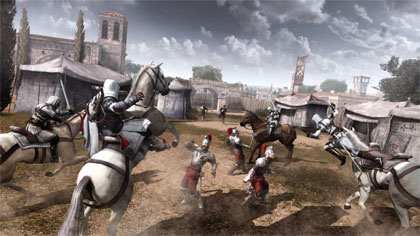
Sadly, Ezio's happiness is fleeting. Without warning, the peaceful town of Monteriggioni is attacked by Cesare Borgia, the son of Rodrigo Borgia (Pope Alexander VI). Even with four or five working cannons, our hero's forces were defeated and the town was reduced to rubble. With the townspeople safely fleeing through the secret underground tunnels, Ezio is out for blood. His plan is to move to Rome and set up a brotherhood of assassins, all leading up to taste of sweet revenge.
Confused? Then it's probably because you didn't play Assassin's Creed II. Players that dig into this without going through the first two games will be utterly baffled from beginning to end, even with the tiny recap at the beginning. Newcomers will be even more perplexed by the present day Desmond story happening concurrently with Ezio's adventure. Needless to say, this is not a great starting point for the Assassin's Creed virgins.
However, for anybody who had a great time killing historical figures from the 15th century, Brotherhood is an essential part of the Assassin's Creed story. Thankfully it's more than just a good story, it's also a great playing adventure game full of memorable characters, exciting set-pieces and one huge twist that will have players scratching their heads until all is revealed in Assassin's Creed III. This sequel may not have a number after its name, but it's every bit as important as any other installment.
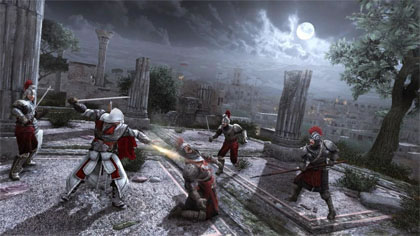
The gameplay is largely the same, with Ezio using stealth to take down his enemies. He does this by blending in with the large crowds, jumping in hay bales and using the rooftops to plan daring attacks. He's the same killing machine we came to love in Assassin's Creed II, only now he's really pissed off about the destruction of his city. This rage is underscored by the reworked combat mechanic, which rewords players for being aggressive. Gone are the slow and drawn-out battles. In their place are slick fights that look every bit as good as they play. This is the first time I've had fun fighting guards in an Assassin's Creed game.
All of the action takes place in Rome, a large city full of familiar landmarks and faces. It won't take long for Ezio to get mixed up again in the drama of the city, forced to run errands for friends and kill people to gain more information. There's a sizable story here, one that includes a lot of really exciting events in famous buildings and outdoor locations. Usually I would be disappointed by returning to a familiar world (see my Crackdown 2 review), but I was excited to travel back to 16th century Italy. This is such a rich time, a perfect setting for a game like this. I'm glad the developers had a chance to dig deeper into the fiction of this world.
It doesn't hurt that there's always something to do in Rome. It takes a few hours before it becomes clear, but Assassin's Creed: Brotherhood is a completionist's nightmare. There's so much to do here that it's almost intimidating. When not taking on story missions, Ezio working to eliminate the Borgia controlled areas of Rome. He does this by killing a marked officer and then literally burning down their tower. It's not subtle, but it sends a message. Once he's destroyed the Borgia control, Ezio is free to invest in local shops, banks, landmarks and more. The more property he owns, the more money is earned. It won't be long before our hero is rolling in more money than he knows what to do with.
Another new gameplay mechanic involves using your brotherhood to fight your battles for you. As he makes his way through Rome, Ezio will pick up a few followers that will train under him. Players choose to either keep these computer-controlled characters around for protector or send them off to fight far away battles. Either way, these characters are gaining money and experience from each battle. At home these fighters are just waiting for you to push the button. They spring into action by jumping out of hay bales or leaping down from a rooftop. Not only are they great at taking down guards, but they make such a commotion that it's easy for Ezio to sneak past undetected.
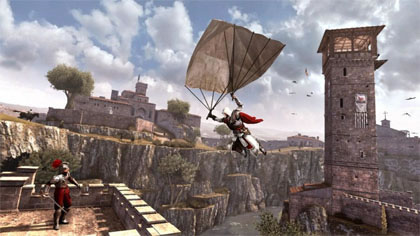
All of these ideas make Brotherhood a more interesting game, even if the story isn't quite as epic as previous installments. I was happy to see that the present Desmond and the other present day elements were saved for the beginning and end, leaving the Ezio portions of the game uninterrupted. The good news for Kristin Bell fans is that the user is now able to control when they enter and exit the animus. Considering how dull present day is (not to mention how annoying those characters are), I didn't have a lot of reason to exit Rome.
Actually, that's not true. I had plenty of reason to leave Rome, but it wasn't to hang out with Lucy and her science buddies. Instead it was to play Brotherhood online. Much had been made about this game's online multiplayer component leading up to its release, but I was skeptical that the developers would be able to translate Assassin's Creed's unique gameplay into the online arena. They have. While I won't say it's the highlight of the package, there's no denying how much fun Brotherhood can be online.
The concept is surprisingly simple: You play an assassin trying to blend in with the crowd, stalk your opponent and take them down without being noticed. Points are earned by how quietly you perform the attack, the skill level and more. It's up to you to earn as many points as you can before time runs out. There's just one problem - you are also a target. This means that while you stalk your prey, you will need to be mindful of who else is trying to kill you. It's a nerve racking experience that leads to some truly tense matches.
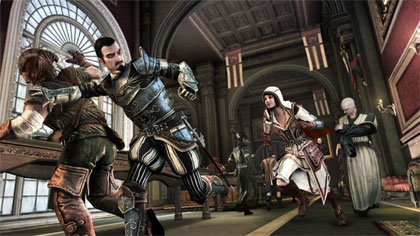
Much like the recent Call of Duty sequels, players are rewarded for leveling up their virtual assassin. Online players who put a lot of time and effort into their character will earn new abilities, new clothing options and even extra characters. It won't take long to earn powers that make it easier to blend in with the crowd and run faster, all making you rethink your online strategies. It's a cool concept that I would like to see explored in future Assassin's Creed games.
I'll be the first to admit that this game genuinely surprised me. I knew it was going to look good and the voice acting was going to be spot-on, but I had no idea that I would have this much fun controlling Ezio again. This game is full of new gameplay mechanics that improve that game in substantial ways, all while reminding me why I enjoyed Assassin's Creed II in the first place. And just when I thought it couldn't get any better, the game offers a worthwhile online multiplayer mode. Assassin's Creed: Brotherhood proves once again that this series is headed in the right direction.
HOME |
CONTACT |
NOW HIRING |
WHAT IS DEFUNCT GAMES? |
NINTENDO SWITCH ONLINE |
RETRO-BIT PUBLISHING
Retro-Bit |
Switch Planet |
The Halcyon Show |
Same Name, Different Game |
Dragnix |
Press the Buttons
Game Zone Online | Hardcore Gamer | The Dreamcast Junkyard | Video Game Blogger
Dr Strife | Games For Lunch | Mondo Cool Cast | Boxed Pixels | Sega CD Universe | Gaming Trend
Game Zone Online | Hardcore Gamer | The Dreamcast Junkyard | Video Game Blogger
Dr Strife | Games For Lunch | Mondo Cool Cast | Boxed Pixels | Sega CD Universe | Gaming Trend
Copyright © 2001-2025 Defunct Games
All rights reserved. All trademarks are properties of their respective owners.
All rights reserved. All trademarks are properties of their respective owners.






